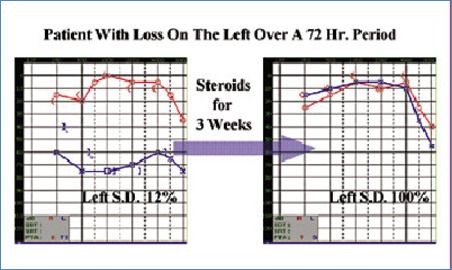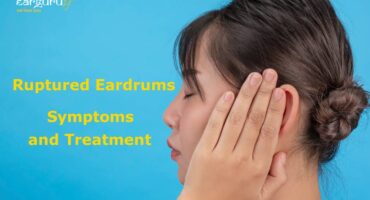Dr. Preeti Talwar
Sudden Hearing Loss or Sudden Sensorineural Hearing Loss is an unexpected loss of hearing which is immediate and takes place overnight or over a period of a few days. In normal cases of sensorineural hearing loss, the loss progresses slowly over a period of months or years. Sudden Sensorineural deafness occurs due to a defect in the inner ear or the sensory part of our ear.
In some cases, people with normal hearing realize they have deafness when they get up the next morning. Some people realize they have a hearing problem when they try to use the phone in the affected ear and cannot hear clearly. The intensity of SSNHL differs from person to person and can be from mild to severe. One should not neglect sudden deafness and if left untreated, the loss can become permanent.
Table of Contents
- Can You Suddenly Go Deaf In One Ear?
- What Are The Symptoms Of Sudden Deafness?
- Is Sudden Sensorineural Hearing Loss An Emergency?
- How Is Sudden Hearing Loss Identified?
- What Are the Treatments for Sudden Hearing Loss?
- How Long Does It Take To Recover From Sudden Hearing Loss?
Why Have I Suddenly Gone Deaf In One Ear?
Since the loss is sudden and unexpected, the first thought which crosses one’s mind is ‘Why have I suddenly gone deaf in one ear? Since this type of deafness is not very common, not many people know that this is a sign of sudden single sided deafness and they should seek medical help as soon as possible.
Can You Suddenly Go Deaf In One Ear?
The answer is yes, however it affects a very small percentage of people. Sudden Sensorineural hearing loss (SSHL) is mostly unilateral hearing loss or is hearing loss in one ear. Less than 10% of the recorded cases are of hearing loss in both ears, some studies claim that sudden bilateral hearing loss cases are in the range of 1-2%.
What Does Sudden Deafness Feel Like?
People who experience sudden deafness in one ear experience a variety of symptoms which may vary from person to person. Some experience a sudden muffled hearing in one ear; they experience difficulty in following conversations and are unable to hear if the background noise is high. Some suffer from high frequency hearing loss and find it difficult to hear high-pitched sounds. People also suffer from dizziness, balance issues or vertigo and tinnitus (ringing in the ears)
How Common Is Sudden Sensorineural Hearing Loss In One Ear?
Sudden deafness is not as common as other types of hearing loss. Between one to six persons per 5000 suffer from this problem. The August issue of Otolaryngology — Head and Neck Surgery record the figure as 66,000 cases per year in the United States. In fact, the figure could be higher as some cases often go unrecorded.
Read our blog on What is Hearing Loss? All FAQs Answered for all your queries on the topic of hearing loss.

What Are The Symptoms Of Sudden Deafness?
Majority of the people experience a “pop” in the ear before the hearing deteriorates. People experience a variety of symptoms like
- Sudden muffled hearing in one ear
- Fullness or stuffed or clogged ears
- Dizziness
- Loss of sensation in the pinna of the ear (the soft part of the earlobe)
- Ear balance problems or vertigo
- Tinnitus or ringing in the ears
- Difficulty in hearing high- pitched sounds or High frequency hearing loss
Is Sudden Sensorineural Hearing Loss An Emergency?
Sudden Sensorineural Hearing Loss in one ear or sudden deafness noticed overnight or over a few days is a medical emergency. In Audiological or medical terms, if the loss of hearing is in the range of 30 dB and above in 3 connected or consecutive frequencies, it is most probably a case of sudden deafness.
People do not rush to the Doctor as the first option is to wait for some time expecting it to clear by itself or try self-treatment. People do not consider it as an emergency and try cures for allergies, check for earwax and also some home remedies like gargling with warm water etc before they consult an ENT doctor. Sudden deafness is mostly permanent in nature, however, early treatment may restore some of the loss. A window of 14 days is considered crucial for effective treatment, the chances of recovery decrease if the treatment starts after 2 weeks.
What Are the Causes of Sudden Hearing Loss?
Different kind of disorders affecting the ear can lead to Sudden Sensorineural Hearing Loss or SSHL. Only in 10% of the cases, a clear identifiable cause is diagnosed. SSHL is known as Idiopathic Hearing loss or hearing loss due to unrecognized causes. The factors which could lead to Sudden deafness are:
- A tumour on the auditory nerve
- Infectious diseases like Lyme Disease
- Autoimmune diseases (Cogan’s syndrome)
- Trauma to the head or spine
- Exposure to ototoxic drugs
- Reduced blood circulation to the ear
- Prolonged exposure to loud sounds
- Continuous stress
- Untreated chronic middle ear infection
- Neurological problems like Multiple Sclerosis and inner ear disorders like Meniere’s Disease.
How Is Sudden Hearing Loss Identified?
After a preliminary look into the ear with an otoscope to check for temporary blockages and infection, the doctor will direct you to the Audiologist for a pure tone Audiometry test. If the audiometry test results show that the loss is in 3 connecting frequencies and the drop in hearing level is 30 dB, this will confirm the diagnoses of sudden deafness.
The doctor can further advise test like MRI test (Magnetic Resonance Imaging) and ABR (Auditory Brainstem Response) to narrow down on the exact cause of deafness.
How Long Does Sudden Deafness Last?
One of the important factors in early recovery from sudden deafness is the time of starting the treatment. Right diagnosis and treatment improve the chances of recovery; however, it also depends on the cause. One should visit a doctor immediately if one experiences the above symptoms and avoid self-treatment or unnecessary delay. People treated within the first 14 days showed a higher recovery rate. The recommended treatment is the use of corticosteroids. People suffering from Mild to Moderate sudden deafness have a 60% chance of recovery. Treatment started after 2 weeks has shown very poor chances of recovery.
What Are the Treatments for Sudden Hearing Loss?
The recommended treatment for Sudden Sensorineural Hearing Loss is the immediate use of corticosteroids over a period of 2 to 3 weeks.
Antibiotics are also prescribed if the cause is infection. People should be particular about their diet and medicines if they are suffering from diabetes, cardiac problems and hypertension, keeping these diseases in control can also help in early recovery.
In case, the person is under treatment for another ailment and the medicines are the cause of ototoxicity, the doctor will change the medicines to reduce ototoxicity.

Do Steroids Help in Sudden Deafness?
Steroids are beneficial when the cause of sudden deafness is unknown. Corticosteroids act immediately to reduce inflammation and decrease swelling. Doctors generally prescribe Intratympanic Steroid therapy or injecting steroids into the middle ear as research has shown this procedure as a more effective method.
How Long Does It Take To Recover From Sudden Hearing Loss?
There is a healthy recovery in 32-79% of the cases if the treatment starts within the first two weeks. The chances of complete hearing recovery are less for patients if the sudden Sensorineural hearing loss is accompanied by vertigo, tinnitus or is severe to profound. Lower the age, better are the chances of a complete recovery.
Since the cases of sudden deafness are very low, it is natural that people are not very well informed compared to other types of hearing loss.
We answer some of the FAQ’s (Frequently Asked Questions) for the benefit of our readers.
Is Sudden Hearing Loss A Sign Of A Stroke?
People who experience Sudden Sensorineural Hearing Loss are vulnerable to a stroke. Any symptoms of sudden deafness is a warning, a complete health check is a must to avoid an actual stroke which might take place in the near future.
What Causes Sudden Hearing Loss in the Elderly?
The chances of getting SSHL is higher in the age group of 50 to 60 years, the problem could be hereditary or occur because of the changes in the inner ear and the auditory nerve. Scientists feel that the changes could be due to exposure to noise throughout life and other damaging factors which slowly wear down the ear’s delicate machinery. Diseases like Diabetes, Hypertension, Cardiac problems increase the chances of SSHL among the elderly.
Can Neurological Problems Cause Hearing Loss?
Auditory Neuropathy or nerve deafness is the disruption of impulses travelling from the inner ear to the brain. The person can hear but cannot understand resulting in poor speech discrimination. Though it is a hearing loss it’s not considered as SSHL.
Which Illnesses Causes Sudden Hearing Loss?
A number of diseases like Meningitis, Mumps, Cytomegalovirus, Jaundice and Chickenpox can lead to Hearing Loss in one ear. Read about the common diseases which cause hearing loss.
Can Stress Cause Sudden Hearing Loss?
Our body responds to stress which leads to overproduction of adrenaline, this lessens the blood flow to the ears, which affects hearing leading to damage of ear cells. This can lead to Sudden Sensorineural Hearing Loss. Read more on how stress affects our hearing.
Can Earwax Cause Sudden Hearing Loss?
Our ear secretes earwax in the canal to protect our ear from dust and water. Excessive secretion of earwax can lead to ear blockage which in turn can lead to hearing loss. However, this loss is temporary.
Can A Viral Infection Affect Your Ears?
A particular group of viral infections can cause direct damage to the inner ear structure. Some others can cause inflammation leading to damage and a few can increase susceptibility to bacterial and fungal infection. All these can lead to hearing loss. Read our article on fungal ear infection for more information.
How Do I Know If My Hearing Loss Is Permanent Or Temporary?
As soon as one notices any change in hearing one should pay a visit to the doctor to confirm the type of hearing loss. It can be temporary if it’s due to ear infection or excessive earwax. Or it can be permanent if its noise induced, genetic, trauma induced or due to ototoxicity. Pure Tone Audiometry Test can determine the type of loss.
References



